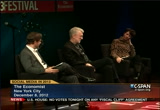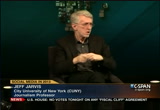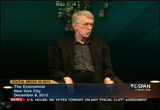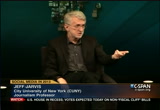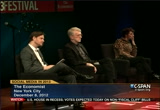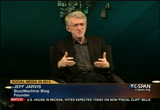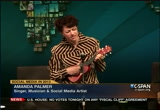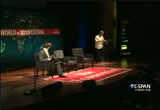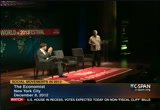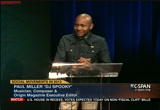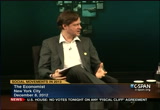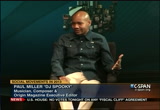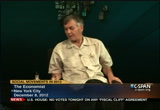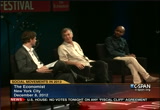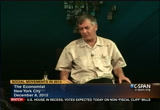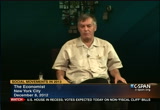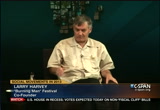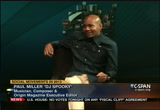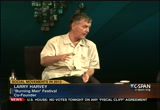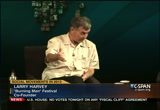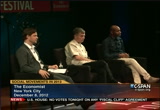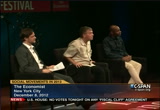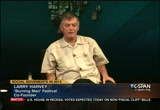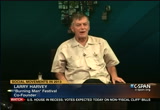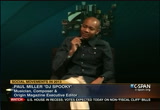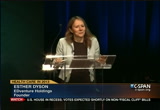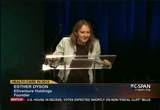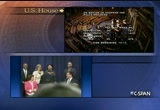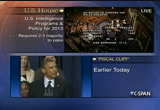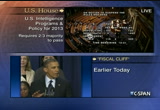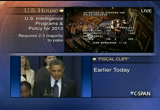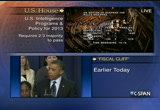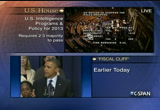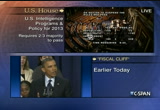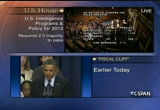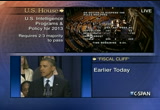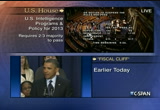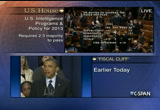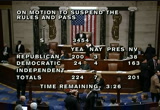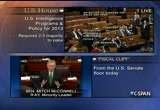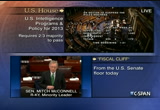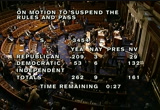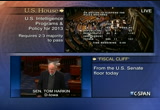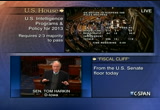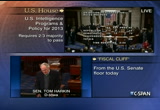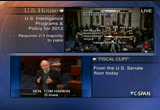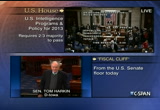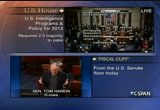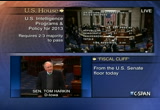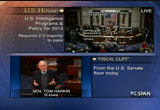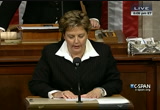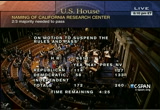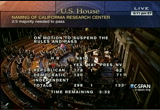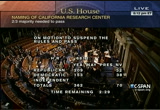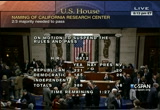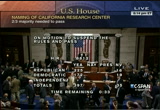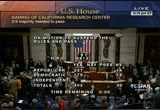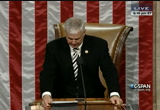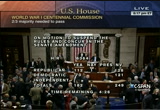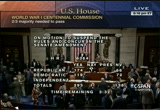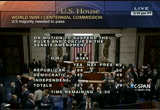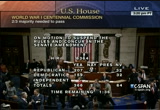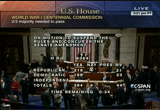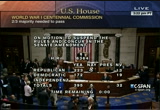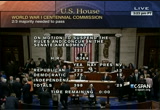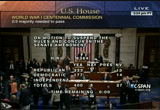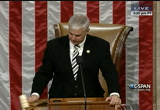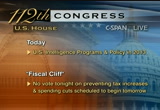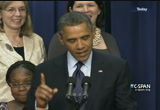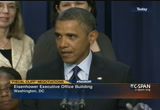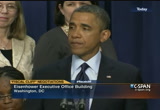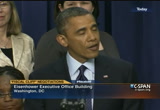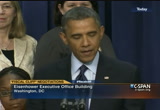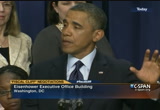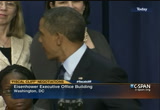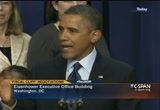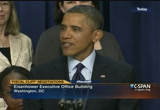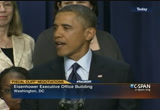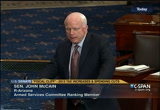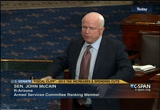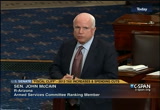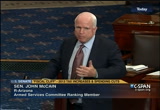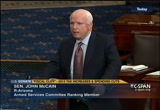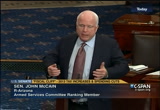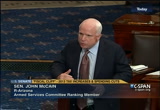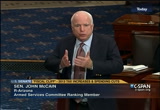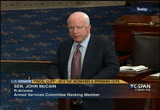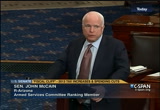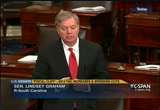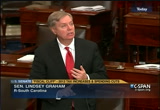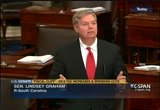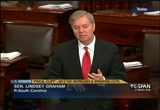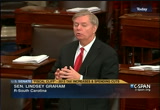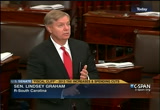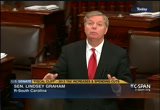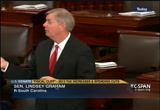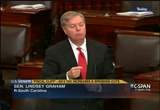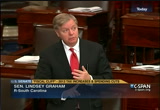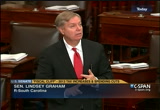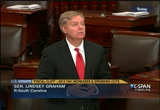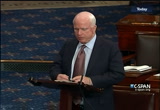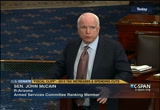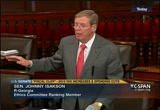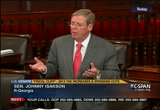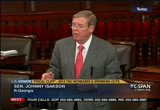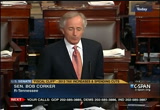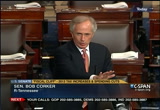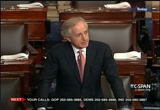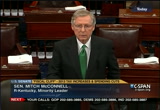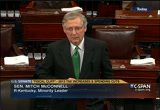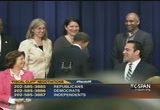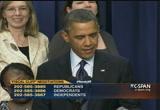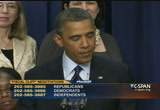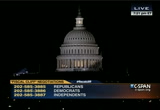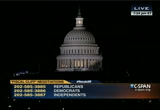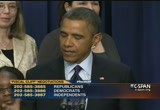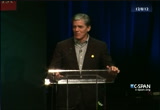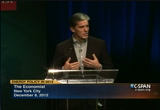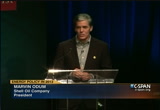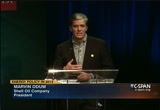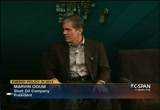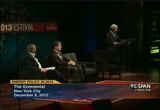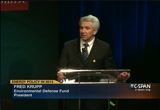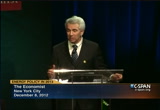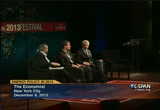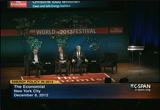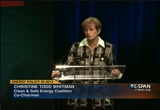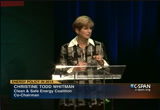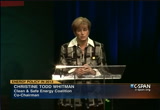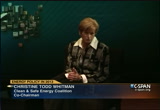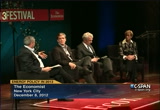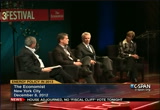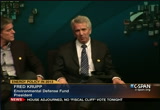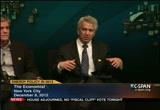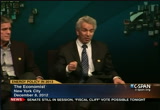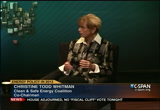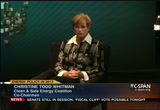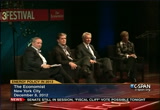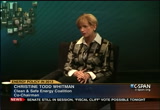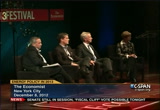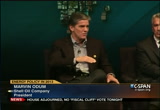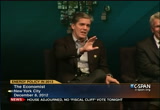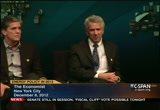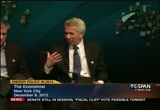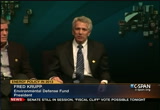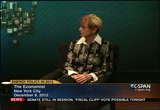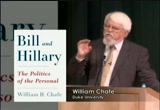tv Public Affairs CSPAN December 31, 2012 5:00pm-8:00pm EST
5:00 pm
assholes, you engage with your fans on twitter, can you tell a personal story? >> this ties in really well with the use of social media. it really does bother me to this day when people say i don't really get twitter. it is people sharing photos of their breakfast and talking about really inane stuff. how can it possibly be useful? i counseled musicians for a dozen years and a few days ago, i announced that i was canceling an entire season of shows that went on sale, thousands of tickets purchased that will have to be refunded or postponed because of my best friend is in treatment for cancer and i want to stay with him. by sending an e-mail to my fan
5:01 pm
a best friend is in treatment. i do not send a press release. and what was fascinating was i woke up and the news had not been announced. the first saw were people had not heard the information from me. the voices sound like teenagers. someone was quitting my dad is disappointed. there is a handful of these. thousands of people came to me
5:02 pm
with lerone stories about having had cancer themselves. kirtland changing experience. outpouring of law only understanding when compassion but these people bring their personal stories on his face would. and were you can fit information in a small space. 10 years ago the only choice was to send a press release and pray that everyone understood and instead i engaged in one of the most touching, deep interaction with my fan base people are saying i am sitting on the subway crying while reading your twitter feet.
5:03 pm
-- feed. there is a constant conversation. we could talk about this for hours. >> you end up with more faith in your fellow man. >> so much about this is everyone is able to share the possibility of that connection. >> the number of things we have to pay attention to has increased exponentially. >> you are on the train, you keep a rock star schedule. just keeping up with all these things wears me out.
5:04 pm
i am going to throw my phone in the leg. >> in the early days, people would say i do not have time for this, have more important work. i would say these things might -- save effort. it has changed the way i have lived. i am reading all this stuff going on here. i find it harder to concentrate. on longer things. it comes back day after day. it -- it changes the way we do things. there is wonderful -- i recommend looking this out. about the gutenberg parenthesis. before, we communicated mouth to mouth and things changed. there was terrible sense of ownership. convert changed everything -- gutenberg taste everything.
5:05 pm
he argues we're going back to a more natural state. i would like to take some questions from the audience. if there are some. i think i saw -- >> so facebook is a distribution platform. there's a lot of value to you. as a consumer of content in thrown off when your content is prioritized over my friends' or my mom's. my news feed is controlled by an algorithm. >> there is a motion saying that google should be neutral. it is useless. i what relevance. -- want relevance.
5:06 pm
google gets signals about me and give me more relevance. i welcome that. i welcome my overlord. i for one do. algorithms are made by humans and they have prejudices. a brilliant researcher at harvard talks about his book, the predecessor of the duodecimal system. there is 100 numbers in christianity and 54 judy ism and one for everything else. there is a prejudice built in and you have a proper complaint about that. here is the feedback loop. you start using it less. it arises or you lose the service because it does not do a good job. if there is a feedback loop it will work. >> what about the danger that we just get cat videos. the things that people do more.
5:07 pm
>> i welcome cat videos. >> i love cat videos. >> this is a question for jeff. social media is the platform for speech in general. isn't it true people hide behind their screens and say things online that it would not say face-to-face? does not change the way we speak to each other fundamentally? >> we talked about that. how do you see this evolving? >> as an artist, that is a sensitive question. i spent a lot of time discussing this with artists and musicians because criticism is painful. when you are sharing personal art. and that is -- that is one of the most painful things to write a personal song and read the youtube comments.
5:08 pm
but she is ugly. this is a big conversation right now between me and the artists. a used to be that you would just not read your reviews. that is pretty easy. now if you are engaging with their fans, your ability to go back and forth is directly polluted by people saying negative things that you come in can be very painful and i see. one thing about twitter is unlike youtube, it remains a generally positive place. those throwing out negativity look like assholes and it is easy to call those people out and say you're not welcome here. >> unless you are a troll. that is your goal. >> it is difficult to be a trial on twitter. >> i know a few. >> what i would hope and you
5:09 pm
just spoke to this, the internet will move towards a more twitter-like atmosphere in which people are accountable for what they say at the dinner table -- .s at the dinner table crud you have an identity and our reputation, the way you -- the way you present is important. my hope is this is true and it is a pain in the ass now. personality on the internet will demolish the patrol. >> we have one question. >> we know that social media plays a big role. do we need to change the title of social media? >> do you have a suggestion?
5:10 pm
>> revolution. political media? i do not know. do think that social media or are we going to call it -- it will play a bigger role. in peace in the world. and tolerance between cultures. there's hope for -- do you see hope for peace in the world? >> [inaudible] or education or journalism because they're a bunch of dolts. i do not believe that. they can be used for bad. it is not media. it is not a mediator.
5:11 pm
it connects us. maybe it is a social connector. very important to say they were not done by tools, there were done by a brave people with vision. all they have is a few new tools. >> if i were able to produce a ukulele, would you be willing to place a song? -- play us a song? >> and a microphone. >> thank you. ♪ >> i love your question and i love your answer. i want to go on record saying i have never seen more positive
5:12 pm
change than hanging out on twitter for the last few years. it is extraordinary what is happening and especially looking at young people and what they're being exposed to. and how they're connecting, you know, it is amazing. and i have never called it [inaudible] media. is someone else's job. we just use it. ♪ this is a song for you. i am not ukulele player. i am a piano player. you will understand why. ♪ side vicious played a four string bass guitar and could not sing ♪ ♪ everyone hated him except for the ones who loved him. probablysmack and
5:13 pm
killed his girlfriend nancy spungen ♪ ♪ he would have been happy. ♪ maybe he would not have suffered such a sad end. may be would have sat around just singing nine songs to his girlfriend ♪ ♪ to play your favorite cover songs especially of the words are wrong ♪ ♪ even if your grades are bad it does not mean that you are failing ♪ ♪ bring your etch a sketch to work and play area clearly -- your ukelele ♪ ♪ it is painfully simple, play
5:14 pm
5:15 pm
5:16 pm
5:17 pm
5:18 pm
5:19 pm
harrison will enjoy a huge vogue. it is not my prediction, it is my hope that in 2013 we will finally learn a lesson and began to think of a time not according to the diminished attention spans -- that is only one hope. i did not predict that will happen. i cannot tell you. >> thank you. [applause] >> next on would like to welcome to the east page -- stage paul
5:20 pm
miller. he is a composer, editor, and author. paul is serving as the first artist in revereresidentce. it is a pleasure to share the stage. >> i am a huge fan. what i'm going to do is a little bit of non-linear engagement. going on after larry is like going after john kenneth galbraith. here's my prediction. what we saw in the next election -- last election is one side of the political discourse, they do not do the math. i am predicting that mathematics is going to have to be internalized for republicans to have relevance. ever again. it is kind of a situation where
5:21 pm
one of my favorite writers, the future is here. it is not evenly distributed. 2013 for us next year but the lions had another calendar. even the romans when you think about it, -- it is the ninth month so you can remix everything. the world will become more non- linear and we will enjoy it. [applause] >> we are here to talk about social movements. and the last few years have seen -- and has been a flooring of social movements. 10 years ago or more than that, there was this idea that people were apathetic and it wanted to enjoy their affluence and there was no force behind social change.
5:22 pm
in the last five years we have seen two big ones from opposite sides, we have the tea party and as a response to the crisis we had occupy wall street. at the same time, the tea party movement is seen as may be a fading or a weaker force on the right. and the one-year anniversary came and went quietly. i wonder if you have thought about these currents and what they can teach us about social movements going forward. >> first and foremost i have to admit i am a liberal with a capital l. i believe in women's rights and choice and the fact that most republicans are really annoying. the problem with social movements and a good thing like places like -- about places like moveon.org, is there were
5:23 pm
some manifest as a worsening as their key documents. they seem to have overplayed their hand. ann coulter was never interesting and never will be. if fun part about this is places like burning man are building more cultural capital and i am hoping to see people who have won the culture wars. all these things would make normal tea party people burst into flames. >> you live on the other coast, you're in san francisco. that had apiey oakland different feel. what is your view of the social movement? >> they were reactive. and fizzled away.
5:24 pm
i saw what happened in oakland with occupy. problem is that understood consensus to a fall. it became a degradation of the democratic [inaudible] and it could not come up with a mature way to deal with -- create discourse within their ranks so they could create a coherent set of ideals. to do that you have to concede there is such a thing as hierarchy and it is not necessarily picture " or -- patriarchal. you do not need a formal pecking order but you will get rules and
5:25 pm
order. burning man despite its size and location and is said to be very well-run. there are norms and laws on the ground. >> that is what we do. >> some of you might have been there. >> we build a temporary city in the desert. it has all the -- it is everything any normal city would provide. it last trade days. -- lasts for eight days. it is kind of radical but radical in both senses of that term. radical conventionally means pushing boundaries, going beyond normal categories. the thing about how it is used,
5:26 pm
it is deeply rooted in the human soul. things that go deep. and did not change that are fixed. we created a kind of city that goes to those extremes at the same time. it broadens your view. and we have this roiling improvisation taking place. on government interactions. all that -- of it unplanned. at the center you have a man and the city is without like a big temple complex. and you can find those things at the same time, this radical coherence and freedom. it can begin to do something,
5:27 pm
then new creative -- you great meeting -- create meaning that is substantial. >> one of the most beautiful things, we were talking about are backstage. the idea of cultural capital, considering we're in a context of the economics of culture. one of the most beautiful things about the festival is if you look at this idea of spontaneous order, complexity theory, there is a lot of simple things that go into that. creating convention -- complex a from simple rules. do not call a festival, called a city. -- call it a festival, called it a city. we have created institutions, rather, they created themselves. we formalized it.
5:28 pm
there are ways of building social capital. one thing we did is we said there's no commerce at our event. that is a heterodox economic model. and then we set let's take a step further. make a more positive and say it is a gift ethic. we give thanks to each other and gifts by their nature are not conditional. they're based on exchange. they're based on simply giving things without expectation or return. they have an unconditional value. maybe that is not a term? -- that "the economist"deals with often. it is objective. >> many people are looking at
5:29 pm
the question of happiness and media. trying to come up with -- measuring things other than productivity. >> there is all that happened is research that are going on. and you have daniel pink saying if instead of paying higher salaries, you give autonomy, mastery, and purpose. and that is called meaning. we set up the city entirely for that purpose. >> there is an interesting writer, louis hyde at harvard whose work inspires my work. i'm interested in this idea of a gift economy. i used to give away dj mixes. the fun part about dj culture
5:30 pm
and sampling, it is about the interplay of memory. who owns memory? as we move into the 21st century and -- tangible goods are something that people will be trying to figure out. it is difficult to quantify culture. to quantify the value of these things. but burning man is looking at ancient models. we were talking about the gift economy in indian culture or the south pacific. i have been spending time in a group of islands next to polynesia. they're worried -- it is one of the happiest place on earth but their economy is something like 90% on employment. unemployment on the south pacific island is not -- there is different kinds of gifts as well. >> let's take some questions now from the audience. put your hand up where i can see
5:31 pm
it. these lights can blind you. there is a gentleman down here. >> what do you say now that burning man is becoming a major cultural entity, what is your vision for the future? >> i think we're burning man is today is it started out with four people. i think where it is today in relation to the future [inaudible] which is to say we are ambitious. we attract people from all over the world. we have entities on every continent. we want to turn around and do various things. we want to -- we know the surest
5:32 pm
thing that transmits the values of our culture are these experiences. we're looking at practically -- multiplying tenfold. our folks are starting their anyway. we're going to have to do them faster because we have been down the road and we can be consultant to them. we're building our capacity and that it will get interesting after that. people go out and it will have absorbed, this is the kind of cultural technology. they find a myriad of ways to apply it. when they began to apply it, they have to collaborate. at that point it will start to
5:33 pm
organize itself in ways we cannot imagine. do ise're trying to engineer the world -- a world movement. >> if i can ask you to keep it brief so we can maybe take another one. >> you mentioned that some of these movements have fizzled out. the biggest crisis is climate change. what do you think social movements can do to turn this around and make corporations and governments take action? >> i have been working with 350.org and [inaudible]
5:34 pm
if youy have -- if you have not checked it out, 350.or. -- org. as we have seen with the last election, the discussion was not about the numbers, it was about the emotional logic. hob it cannot argue with the storm. it will comments masher house. even if you are ann coulter, it will smash your house. this is about internalizing science and making the science become part of the cultural vocabulary. the problem with the right-wing agenda with this huge cloud of disinformation is people are very naive and the arts can help and catalyze an emotional discussion. the numbers are speaking. we have had record level
5:35 pm
drought, we have record-level firestorms, and storms. colorado, texas, the list goes on of places that have been hammered. you have to be foolish, someone like george bush to not process that. you have -- it is incredible. you still have to point out, your house is on fire. you are like, really? that is my take on it as a downtown dj. >> the last question on the left. >> thank you. part of what you said about the gift giving economy. an anthropologist wrote a book on the gift economy and wrote another book on "the ethnography of direct action"
5:36 pm
which touched on things that happened with occupy. with social movement, the eupepsia -- maybe you can speak to a -- going toward reaction and fizzling out? or you see this accelerating, moving from a creative too reactive force? >> everything is direction to something. we came from some strain before us. yeah, do you want to do that? >> i will go back to what i said at the podium. i for one, i am a member of what is called the creative class. if it is forcing people to think in longer [inaudible] during booms, as a resident of
5:37 pm
san francisco, i know all about booms. people cannot think about the next quarter or the next day. they cannot think that is guaranteed in a boom that very little creative thinking will happen. more versions of what they now to make more money. it narrows the range of your mind the way fear does on the other end. so i hope it continues for a while. beyond the think next year or the next quarter or the next month, it will not do anything about global warming. we live in a world about which everything in our life is not sustainable. what if everyone in china had two cars and a swimming pool?
5:38 pm
that is not sustainable. the reason we cannot make any political progress is we have this cognitive dissonance. at the beginning of the session assayed save your money and consume more. at the same time. amazing. we have got to get beyond an economy that is predicated on unlimited, increasing amounts of consumption was no end in sight. the end is in sight. maybe if we have to cope with the reality for awhile longer, we can be more intelligent. >> on that note, we have to wrap up. one of the things that intrigued me with these kinds of situations is that ideas are very -- is very scarce resource and we have to think about maximizing and amplifying ideas. that is so incredible. the idea of possibility is so, i think, important to celebrate.
5:39 pm
when i say possibility, if people say you cannot do that and cannot do this and cannot think that, people are like -- there is a [inaudible] at work. we have to rebuild a new economy. above all, the fact that you're right. if we do not do it the planet will do it for us. i will leave it at that. i can imagine the future where there is a tremendous amount of people. the u.s. military considers the weather as a weapon. i will leave it at that. there is intense stuff, i went to antarctica and it looked like a nuclear bomb had gone off over most of the ice. huge chunks of ice falling off but you do not hear that in the news.
5:40 pm
i know we have to wrap up. >> thank you. [applause] >> the house is in recess, expected to vote on three pieces of legislation including the intelligence policy bill for next year. no votes are scheduled tonight on the so-called fiscal cliff trade without any action by both chambers of congress, billions of dollars of tax increases and spending cuts are scheduled to officially begin tomorrow. while we wait for the house to come back into session, more from the economist magazine forum. this is on technological innovations and how they might change medical care in the coming year. >> thank you. i have the pleasure of talking about health care in 2013. 2013 is to be a big year for health care. there is an enormous amount of
5:41 pm
exciting research in global health and personalized madison. at the same time, the affordable care act is continuing its torturous implementation with 2014 as the big year when medicaid will be expanded, when people will be required to get insurance and this question of how you expand access to health care, how you lower-cost is going to heat up in the next year if that is even possible. to discuss these issues, we have esther dyson. she has trained as an astronaut. going to space is much easier. please welcome esther. [applause] >> good morning. i am going to talk briefly and
5:42 pm
make predictions for three markets concerning health. there are the markets for health-care -- they are the markets for health care, and the market for health itself. the health-care market is what you think of as drugs, pharma, hospitals, doctors. in the u.s. we have in quotes, health reform. things are turning toward people -- keeping people healthy rather than treating them when they're sick. the drug companies are going to continue to win because they cannot charge enough money for drugs. the insurance companies are going to whine because they have to treat people that are sick as
5:43 pm
opposed to just a healthy ones they. it will figure out how to align their incentives without -- the government is not tgoing to pay [inaudible] to change their processes to improve that kind of thing. that will continue over. -- overall, it is pretty good but do not expect any changes. the market for bad health, companies are beginning to understand the need to permit out healthy food. they're going to put new additives in the same old bad food. now you have fruit bars with yogurt, or candy with fiber. watch out for more of that. it is hard because there is the huge market for bad food. in includes not just the bad
5:44 pm
food but advertising. everyone around you is eating everything that is full of sugar and salt. that will continue as well. the third market for good health, we're seeing some exciting and dramatic changes. based on two fundamental things that are coming together and you're going to see announcements over the next few days as well as in 2013. >> you can find the rest of this conversation at the c-span video library. taking a down to the floor of the house as members combatant the session. three votes have been scheduled including one on intelligence programs and policy. the speaker pro tempore: pursuant to clause 8 of rule 20, proceedings will resume on motions to suspend the rules previously postponed. votes will be taken in the following order -- senate 3454, de novo, h.r. 6612, de novo.
5:45 pm
the first electronic vote will be conducted as a 15-minute vote. remaining electronic votes will be conducted as five-minute votes. the unfinished business is the question on suspending the rules and passing senate 3454 which the clerk will report by title. the clerk: senate 3454, to authorize appropriations for fiscal year 2013 for intelligence and intelligence-related activities of the united states government and the office of the director of national intelligence, the central intelligence agency retirement and disability system and for other purposes. the speaker pro tempore: the question is will the house suspend the rules and pass the bill. so many as are in favor say aye. those opposed, no. in the opinion of the chair, 2/3 having responded in the affirmative -- the gentleman from arizona. >> mr. speaker, i request the yeas and nays. the speaker pro tempore: the yeas and nays are requested. those favoring a vote by the yeas and nays will rise. a sufficient number having arisen, the yeas and nays are ordered. members will record their votes by electronic device. this is a 15-minute vote. [captioning made possible by the national captioning institute, inc., in cooperation with the united states house of
5:46 pm
6:09 pm
the speaker pro tempore: on this vote the yeas are 373, the nays are 29. 2/3 of those voting having responded in the affirmative, the rules are suspended. without objection the motion to reconsider is laid on the table. the unfinned business is the question on suspendsinged rules and passing h.r. 6612 which the clerk will report by title. the clerk: h.r. 6612, a bill to redesignate the dryden flight research center as the neil a. armstrong flight research center as the huhg l. briden -- dryden test range. the speaker pro tempore: those in favor say aye. those opposed, no. in the opinion of the chair -- the gentleman from pennsylvania. the yeas and nays have been
6:10 pm
requested. all those in favor of taking this vote by the yeas and nays will rise and remain standing until counted. a sufficient number having arisen, the yeas and nays are ordered. members will record their votes by electronic device. this is a five-minute vote. [captioning made possible by the national captioning institute, inc., in cooperation with the united states house of representatives. any use of the closed-captioned coverage of the house proceedings for political or commercial purposes is expressly prohibited by the u.s. house of representatives.]
6:16 pm
the speaker pro tempore: on this vote, the yeas are 404, the nays are zero. 2/3 being in the affirmative, the rules are suspended, the bill is passed and without objection, the motion to reconsider is laid on the table. the unfinished business is the question on suspending the rules and concurring in the senate amendment to h.r. 6364, which the clerk will report by title. the clerk: h.r. 6364 an act to establish a commission to observe a centennial of world war i to provide for the designation of memorials to the service of members of the united states armed forces in world war i and other purposes. the speaker pro tempore: will the house concur in the senate amendment. those in favor say aye. those opposed, no. in the opinion of the chair, 2/3 being in the affirmative -- the gentleman from virginia. >> mr. speaker, on that vote, i ask for the yeas and nays.
6:17 pm
the speaker pro tempore: the yeas and nays are requested. those favoring a vote by the yeas and nays will rise. a sufficient number having arisen, a vote is requested. members will record their votes by electronic device. this is a five-minute vote. [captioning made possible by the national captioning institute, inc., in cooperation with the united states house of representatives. any use of the closed-captioned coverage of the house proceedings for political or commercial purposes is expressly prohibited by the u.s. house of representatives.]
6:25 pm
the speaker pro tempore: the yeas are 400, the nays are 5, 2/3 being in the affirmative, the rules are suspended -- the speaker pro tempore: on this vote, the yeas are 401, the nays are 5. 2/3 being in the affirmative, the rules are suspended, the senate amendment is agreed to and without objection, the motion to reconsider is laid on the table. the gentleman from georgia. >> mr. speaker, i ask unanimous consent that when the house adjourns today, it adjourn to
6:26 pm
6:27 pm
hearing none, for what purpose does the gentleman from wisconsin seek recognition? >> mr. speaker, i now move that the house adjourn. the speaker pro tempore: the question is on the motion to adjourn. those in favor say aye. those opposed, no. the ayes have it. the motion is adopted. the house stands >> fiscal cliff negotiations continue between congress and the white house. the house returns tomorrow at noon eastern. we will have coverage here on c- span.
6:28 pm
president obama spoke about the afternoon,ff this ev but in the agreement will not happen before tomorrow. his remarks are 10 minutes. >> happy new year to you. hello, everybody. thank you. please, everybody, have a seat. good afternoon, everybody. welcome to the white house. i realize that the last thing you want to hear on new year's eve is another speech from me. but i do need to talk about progress that is being made in congress today. for the last few days, leaders of both parties have been working on an agreement that will prevent the middle-class
6:29 pm
tax hikes hitting 90% of all americans starting tomorrow. preventing that tax hike has been my top priority. it is the last thing that folks like who are appear on this stage can afford right now, to pay an extra $2,000 in taxes. the middle class taxes cannot afford it -- middle-class families cannot afford it, and our economy cannot afford it. today it appears that an agreement to prevent this new year's tax hike is within sight. but it is not done. there are still issues left to resolve, but we are hopeful that congress can get it done. but is not done. so part of the reason i want to speak to all of you today is to make sure that we emphasize the congress and members of both
6:30 pm
parties understand that all across america this is a pressing concern on people's minds. now, the potential agreement that is being talked about would not only make sure the taxes don't go up on middle- class families, it also would extend tax credits for families with children, it would extend our tuition tax credit that has helped millions of families pay for college, it would extend tax credits for clean energy companies that are creating jobs, it would extend unemployment insurance to 2 million americans who are actively looking for jobs out there. i have to say that ever since i took office, throughout the campaign, and over the last couple of months, my preference would have been to solve all these problems in the context of a larger agreement, a bigger
6:31 pm
deal, a grand bargain or whatever you want to call it, that solves the deficit problems in a balanced and responsible way that does not just deal with taxes but also spending so that we can put all this behind us and focus on growing our economy. with this congress, that was obviously too much to hope for at this time. [laughter] maybe we can do it in stages. we will solve this problem instead in several steps. in 2011, we started reducing the deficit through $1 trillion in spending cuts which have taken place. the agreement being worked on right now would further reduce the deficit by asking the wealthiest 2% of americans to pay higher taxes for the first time in two decades so that would add additional hundreds of billions of dollars to deficit reduction. that is progress but we will need to do more.
6:32 pm
keep in mind that just last month, republicans in congress of they would not agree to raise tax rates on the wealthiest americans and the agreement being discussed would raise those rates permanently. [applause] keep in mind, we will still have more work to do. we still have deficits that have to be dealt with, we will still have to think about how we put our economy long term project for growth, how we continue to make investments in education and infrastructure that help our economy grow. keep in mind that the threat of tax heights going up is only one part of this so-called fiscal cliff. what we also have facing us starting tomorrow or automatic spending cuts that are scheduled to go into effect. keep in mind that some of these
6:33 pm
spending cuts that congress has said will automatically go into effect have an impact on our defense department but that also have an impact on things like head start. there are some programs that are scheduled to be cut. we are using an ax instead of a scalpel. it may not always be the smartest cuts. that is a piece of business that still has to be taken care of. i want to make clear that any agreement we have to deal with these automatic spending cuts, those also have to be balanced. my principle has always been to do things in a balanced, responsible way and that means revenues as to be part of the equation in turning off the sequester as well as spending cuts. the same is true for any future deficit agreement.
6:34 pm
we will have to do more to reduce our debt and deficit. i am willing to do more but it will have to be balanced. we will have to do it in a responsible way. i am willing to reduce our government's medicare bills by finding new ways to reduce the costs of health care in this country. that is something which all agree on. we want to make sure that medicare is there for future generations but the current trajectory of health care costs is going up so high that we have to find ways to make sure that it is sustainable. that kind of reform has to go hand in hand with doing some more work to reform our tax code so that wealthy individuals, the biggest corporations, cannot take advantage of loopholes and deductions that are not available to most of the folks standing up here for most americans. there is still more work to be done in the tax code to make it fair even as we are also looking at how we can strengthen something like
6:35 pm
medicare. if republicans think i will finish the job of the deficit reduction through spending cuts alone, you hear that sometimes, after today that we will try to shove a always spending cuts -- [applause] shoved spending cuts that will hurt seniors or heard students or hurt middle-class families without asking also equivalence sacrifice from millionaires or companies with a lot of lobbyists. if they think that will be the formula for how we solve this thing, they've got another think coming. that is not how it will work. we've got to do this in a balanced, responsible way and if we're going to be serious, then it will have to be a matter of shared sacrifice as long as
6:36 pm
i'm president. and i will be president for the next four years. [applause] any way -- for now, our most immediate priority is to stop taxes going up for middle-class families starting tomorrow. i think that is a modest goal that we can accomplish. democrat and republicans in congress have to get this done but they're not there yet. they are close but they are not there yet. one thing we can count on with respect to this congress is that if there is even one second left before you have to do what you are supposed to do, they will use that last second. @ -- as of this point, it looks like i will spend new year's here in d.c.
6:37 pm
you all will be hanging out in d.c., too. i can come to your house? [laughter] i don't want to spoil the party. the people who are with me here today, people watching at home, they need our leaders in congress to all stay focused on them, not on politics, not on special interests -- they need to be focused on families, students, grandmas, folks who are out there working really, really hard and are just looking for a fair shot and some reward for that hard work. they expect our leaders to succeed on their behalf and satellite. -- and so do i.
6:38 pm
keep the pressure on over the next and let's see if we can get this thing done and i thank you all and if i don't show up at your house, i want to wish everybody a happy new year. thank you very much. [applause] [captioning performed by national captioning institute] cable satellite corp. 2012] >> about a half hour after the president's remarks, mitch mcconnell said he had reached an agreement with the white house on taxes, but not on spending cuts that are part of the fiscal cliff. mr. mccain: may i thank the senator from maryland, as
6:39 pm
always, for her usual courtesy and i think she had a very important message and i appreciate not only the words themselves but her eloquence and passion. mr. president, i ask unanimous consent that the senator from south carolina be included in a colloquy during my remarks. the presiding officer: without objection. mr. mccain: mr. president, i, like i believe all of us just finished watching the president's remarks at -- i guess it was the executive office building. and i'm not sure yet as i sort out my impressions of the president's remarks as to whether to be angry or to be saddened. i've been around this town for a number of years, and as is well known, i had an interest in the presidency more than academic and i've watched a lot of
6:40 pm
presidents, going back to president reagan from the standpoint of a member of congress. and i've watched these other crises as we go through them, whether it be the potential shutdown of the government when newt gingrich was speaker of the house, we've seen these other crises as the debt limit expired and a number of others. and it's sometimes unfortunately a way -- the way we do business here. but i must say at a time of crisis, on new year's eve when at midnight at least certain actions take place or have to be planned to take place, we have the president of the united states go over and have a cheerleading, ridiculing of republicans' exercise in speaking to the people of the united states of america.
6:41 pm
as i watched other presidents address crises, the way that they were able to address them and resolve them with presidential leadership -- and that's why we elect presidents, to lead -- they did it by calling the leaders of both parties to the white house and sit around the table and do the negotiations and the discussions and they are sometimes concessions have to be made, compromises have to be made. so what did the president of the united states just do? well, he kind of made fun, he made a couple of jokes, laughed about how people are going to be here for new year's, sent a message of confrontation to the republicans, i believe he said if they think they're going to do that, then they've got another thought coming. i guess i have to wonder, and i think the american people have to wonder whether the president
6:42 pm
really wants this issue resolved or is it to his short-term political benefit for us to go over the cliff? i can assure the president of the united states, i can assure him that historians judge presidents by their achievements. we all read the polls. we all, republicans, know what is in the polls. and that is the majority of the american people, 50-some percent approve the president of the united states. we also see the approval ratings of congress, 10%, 12%, 15%, and i haven't seen one that high lately but historians judge presidents by what happens on their watch. and for the president to go out and make comments which clearly, which clearly will antagonize members of the house, we are a bicameral government here, and will
6:43 pm
clearly antagonize them because once we get an agreement, and i appreciate the negotiations that have been going on here in the senate between the majority leader and the republican leader. the fact is that whatever is done and whatever is agreed to has to be ratified by the house of representatives. men and women who were elected on the premise, promising their constituents that they wouldn't raise taxes. now, whether they should have made that commitment or not, whether that was the right thing to do, the fact is that that's what they said. so the president basically in his talk to whoever it is that group of people he was talking to had who were laughing and cheering and applauding, as we are on the brink of this -- of this collapse of this incredible problem this creates for men and women all over -- all of our
6:44 pm
citizens, so what he was saying is to the republicans on both sides of the aisle but particularly in the house of representatives, take it or leave it. that's not the way presidents should lead. this -- these are draconian effects. now, whether we should be at this cliff or not is another discussion for the scholars in years to come. but we are where we are. frantic discussions are going on. went on in the middle of the night last night. so what's the president of the united states doing? in the middle of this, hopefully they're reaching, there was, as i understand it, a very one major issue remaining , he comes out and calls people together and has a group standing behind him, laughs and jokes and ridicules republicans. why? why would the president of the united states want to do that? and i want to say a word about
6:45 pm
sequestration. sequestration is about to kick in. the pentagon and our defense department is like a giant oil tanker. you got to turn it around in a very difficult and slow manner, because they have to make plans and they have to have contingencies -- procurement of weapons, have to do all the things that are necessary to make sure our men and women who are serving in the military are the best trained, best equipped and most professional in the world, which they are. but we're looking at sequestration here when the department of defense says it will decimate our adilt -- ability to defend this nation. shouldn't the president of the united states be concerned about that? but what is his own secretary of defense is saying and what his own chairman of the joint chiefs of staff, his selection, is saying. instead, we kind of joke around and tell people they're going to be here fear new year's eve. that's not the way to lead this
6:46 pm
nation. so i come to the floor and say to my colleagues, we need to get this done. we all know that we need to get this done. we go over the cliff, we're going to disappoint the people that we are elected to represent and we will disappoint them mightily as we already have. but i also say it is the time for presidential leadership. it's time to stop the cheerleading. it's time to stop the campaigning. the president won. we all know that. he won fair and square. but isn't it now time to govern, and isn't the best way to govern to sit down with people from the other party and from both houses and say this is an issue we must resolve for the good of the american people? so i hope that, again, the president will spend some time with the leaders on borat
6:47 pm
parties in the oval office and sitting down, and ironing this -- ironing this out before the people of this country pay a very heavy price. my friend from south carolina was around when we almost went over the cliff the last time, as we were about to shut down the government and it was all kinds of consequences but we pulled back from the brink after going over it, and it was the most serious of all these that i've seen. and i guess i would ask him, isn't it true that in our experience that presidents, whether they be republican or democrat, no matter what party or affiliation, going back to the famous ronald reagan and tip o'neill relationship where they sat down together and they saved social security for about 25 years, and it was tough
6:48 pm
medicine but they did it together, the president of the united states basically dismissed social security and medicare from his list of priorities, and what, as my friend from tennessee pointed out, we have a $16 trillion debt. and for to us say that we're not going to do anything about spending when we all know that spending is the biggest problem we have in this agreement, again, that is throwing kerosene on the fire that's on the other side of the capitol and that's my republican colleagues on the other side of the aisle who have committed and pledged to their constituents that we will end this hemaging that -- hemorrhaging that we call spending which has given us the greatest debt in the history of this country. so i guess i would ask my colleague from south carolina, who is usually very modest and reticent in explaining his views
6:49 pm
particularly in various media outlets of his view on this situation. mr. graham: thank you, senator. i guess my first view is it's better not to go over the cliff than to go over the cliff, but it's also important, as you just said, to understand what we've accomplished. let's assume for a moment and let's hope that this is a good assumption that we reach an agreement by the end of the day, that raises taxes -- tax rates on people that make over $400,000. i don't think that's a good idea because i think it hurts job creation. the better way to get revenue is to eliminate deductions and exemptions for businesses and wealthy individuals and take that money back into the treasury, lower tax rates to create jobs and pay down debt. that's what bowles-simpson did. not juan bipartisan group who has tried to solve our debt problem and our spending problem
6:50 pm
and our revenue problem suggested raising tax rates. bools, a -- bowles-simpson, a bipartisan group, actually lowered tax rates and did it by eliminating deductions and exemptions and they put a lot of money on the debt, they had a 25% corporate rate and the top personal rate was 30%. they took this $1.2 trillion we give out every year in exemptions and deductions to the favored few, they brought it back into the treasury, they paid down debt and they lowered tax rates to help create jobs. this president's approach is the opposite of simpson-bowles and the gang of six. you had six senators, three democrats and three republicans, how did they try to solve our long-term problems? they reformed the tax code by eliminating virtually all deductions. they took that money back into the treasury. they paid down debt and they lowered tax rates, just like simpson-bowles. now, this president has taken another path. he wants to raise tax rates to
6:51 pm
generate revenue. my concern is the higher the tax burdens in america, the less likely to create a job in america. there are better ways to generate revenue. but he's gone his way and he's going to win. hats off to the president for having the courage of your convictions. you said during the campaign you're going to raise tax rates on everybody who made above $250,000, but you're probably not going to get that but it's going to be somewhere around $400,000. the money to be generated, you say you want it to go on the deficit. that's good. yesterday, the proposal by our democratic colleagues was to take that increased revenue from raising tax rates and they spent $600 billion on the government. and that's why we don't have a deal. i am willing to swallow my pride and vote for a tax rate increase even though i don't think it's good policy just to save the country from going into the abyss and destroying the military. i'm willing to do that, and i will take some heat but that's
6:52 pm
the way democracies are. you win some, you lose some. but what i'm not going to do is raise tax rates on anybody and take that additional money to grow the government when we all know we need to get out of debt. that's what was going to happen yesterday. by 2037, the amount of debt we have in the nation will be twice the size of our economy. every child born in america owes $51,000 of debt on the day of their birth. and when you look at medicare, social security and medicaid, the three big spending programs called entitlements, in about 25 years, the cost of those programs are going to consume all the revenue coming into the government, and there will be no money for the defense department. so when the president said today that round two will be the debt ceiling, he's right. he won round one, but we have done nothing, as senator mccain indicated, to lower the
6:53 pm
deficit in any real way. if you took every penny of the money we're generating from raising tax rates for people above $400,000, that's 6% of the national deficit. so that doesn't even begin to solve the problem. so this is a hollow victory, a victory of revenue with no change in the nation's march toward becoming greece, no real reduction in our deficit or our debt. the good news, senator mccain, is that we're one big deal away from dominating the 21st century because america's problems are really less than most other places. the bad news is that that deal is elusive, it requires presidential leadership, and i haven't seen much of it, and if we say on the course we're on today, we're going to lose the american dream because your grandchildren and your children cannot pay off the debt you're about to pass on to them. so in about two months, round
6:54 pm
two begins and we will be asked to raise the debt ceiling. trust me, i don't want to default on our obligations, but in august of 2011, we borrowed $2.1 trillion because we ran out of money and 42 cents of every dollar we spend is borrowed money. if you don't keep borrowing, you will have to cut the government by 42%. nobody suggests that that's a good idea overnight. but here's what i won't do. i won't continue borrowing money unless we address in the process what got us into debt to begin with. so when we have to raise the debt ceiling again, i'm going to make a simple request. let's come up with a plan bipartisan in nature to save social security and medicare from bankruptcy because they are going to run out of money and become insolvent in the next 20 years, and let's also create a spending reduction plan that will allow us not to become greece. if you want to raise more revenue by capping deductions, you can count me in because we'll need some more revenue.
6:55 pm
but in 17 months, ladies and gentlemen, we spent 2.1 trillion. we're burning through money like crazy. it took us 200 years to borrow the first $2 trillion. we spent $2.1 trillion of borrowed money in 17 months. that's got to stop. so to president obama, congratulations on your tax rate increase. you fought hard and you won. i hope i have the courage of my convictions not to raise the debt ceiling until you and others will work with me to find a plan to begin to get us out of debt. so you mentioned medicare today in your speech. i'm glad you did. in 2024, it completely becomes insolvent. think of how many people in this country need medicare and will need it 20 years from now. if we don't do something, it's going to run out of money. the age of eligibility for medicare recipients is 65. it hasn't changed one day since
6:56 pm
1965 when it was first started. we're all living longer. i propose we adjust the retirement age to 67 over a 10 or 20-year period. that will save the program in many ways. people in my income level, we shouldn't get any money from the government to help buy my prescription drugs. i should pay the full cost because i can afford to. that's called means testing. and this c.p.i. thing you hear a lot about, that's how you evaluate benefits. it needs to be re-evaluated based on real inflation. we're overestimating the cost and it's adding burdens to these programs. so that's kind of technical stuff, but here's what i'm telling you. i am not going to vote to raise the debt ceiling until we do something to save social security and medicare from bankruptcy, and i'm not going to borrow a bunch more money that your grandkids will have to pay off without a plan to get out of debt. if that's too much to ask, so be it, but it's not too much to ask of you at home, because if you spend a lot more money than you make, you go to jail. we call it good government. that's got to stop. so round two's coming, and we're
6:57 pm
going to have one hell of a contest about the direction and the vision of this country. the president we need two months from now is going to be the one who will come down here and talk with us and work with us and not have a press conference, because, mr. president, i want to make you an historic president. i want on your four-year watch for us to change the course of the country. i want to save medicare and social security from insolvency, and i will give you the full credit as a presidential leader if you will help us as a nation to find a way to save these programs from bankruptcy. i want to turn around the spending problem we have that will prevent us from becoming greece, and if you will lead, i will follow, and yes, i will raise more revenue in a responsible way, but without you, it's going to be hard for us to get there. so the next time we meet is going to be around the debt ceiling, and the image i want is not a bunch of people behind the president who are clapping for him, but members of congress,
6:58 pm
republicans and democrats behind the president clapping for the president because he signed a bill that will save all of us from a certain fate. and our fate is being sealed as i talk unless we make changes. we cannot survive on the course we're taking today. the good news is with some bipartisanship and presidential leadership, we still have time to turn around this country and actually dominate the 21st century. it's going to take some pain, it's going to take some sacrifice, but one final story. when i was 21, my mom died. when i was 22, my dad died 15 months later. we were in -- my family owned a liquor store, a restaurant and a pool room, and everybody i know about politics i learned in the pool room. my sister was 13. we had my uncle take over the
6:59 pm
businesses. he left the textile industry to run the businesses. we moved in with my aunt and uncle. they never made over $25,000, $30,000 in their entire life. if it weren't for social security survivor benefits for me and my sister, we would have had a hard time majority it. she went to college on pell grants. i am 57. i'm not married. i don't have any kids. i'm part of the problem. that's what's happening all over america. when i was 22, we needed every penny we could get in social security benefits. today, i could easily give up $400 or $500 when i retire and not feel it at all. i could pay more for medicare, and i would. and i'm going to ask people in my situation to do that. we just have to have the courage to ask. i think most americans will say yes. so medicare and social security are not programs to me. i know what they do for real people. and if we do nothing, in 2032,
7:00 pm
which seems forever but it's not, social security becomes insolvent and you have to cut benefits 25% for everybody whether they can afford it or not or raise taxes by 38%, whether the business can afford it or not. and the way you solve that is you reform the programs like ronald reagan and tip o'neill. mr. president, i am willing to play, along with my other republican colleagues, the role of tip o'neill. you just need to play the role of ronald reagan. so the next time we talk about fiscal problems in america, i want a news conference where the president is center stage, not surrounded by political activists, surrounded by republicans and democrats who can celebrate accomplishing something that we should all be proud of. they tell me this is the least productive congress in the history of the nation. if it's not, i would hate to be
7:01 pm
in the one that was. we haven't done a whole lot up here. senator mccain, i know urve here a few years now. -- i know you have been here a few years now. what's your opinion of where we're going as a nation and how we get along with each other? mr. mccain: well, i would say to my friend, first of all, we have had some meetings of a bipartisan fashion to try and improve the process here so that we can move legislation forward. the issue before us i believe right now at nearly 3:00 p.m., nine hours from midnight, and we still have not reached an agreement, and the longer it takes for us to reach agreement, the less time we will have examining it and the less time we will have before voting. as the senator from south
7:02 pm
carolina said, we can't keep doing business like this, and we can't. but on this particular issue, i want to express as i began my disappointment in the president in having a cheerleading rally when we should be sitting down together and resolving this issue. that's what i have seen other presidents, republican and democrat, do. i hope now that the president has made his statement with his cheering section that now he would sit down as presidents have and should work to hammer out this agreement and agreements in the future. the presidential campaign is over, he won, congratulations. now let's get down to the serious business of governing this country in a bipartisan fashion. i yield to the senator from georgia.
7:03 pm
mr. isakson: i rise for a moment to associate myself with the remarks of the gentleman from tennessee, the gentleman from arizona and the gentleman from south carolina. and i want to tell a personal story somewhat like the south carolinian told. you know, i made my living my entire life before i got here for 33 years selling houses, causing two people to come together and agree on a price, agree on terms, sign, shake a deal and walk away from a closing table feeling like both of them won. i've also been elected to every legislative body i could be elected to in my state, and i've served in the legislatures for 34 years. i have negotiated deals, been on conference committees, and i never once found myself making a deal by intimidating or insulting the other side. what the president did this afternoon set us back in civility and in leadership and in deal making. now, i'm a big enough guy to know i'm not going to take it personally. if the desire was to offend me, the speech did, but if the desire was to deter me, it did not. it is time we all found ways to come together as americans and solve our problems, not just in
7:04 pm
the short run but in the long run, not fill our room through a partisan's borders but instead cause everybody to sit together around the table and find a way to make a deal. this is the greatest country on the face of this earth, and it will continue to be unless we forget what got us here. what got us here are the american people, not the american politicians. the american businessman, the american entrepreneur, the american worker, the american laborer and the american leader, people who through their sweat, their blood and their toil built businesses, built factories, built companies and made this great enterprise known as the united states of america work. if we want to raise our revenue, sure, you can raise by a percentage looks your revenue by raising your assess many, but if you lower your base, your revenue goes down. what we need to do is empower our base by raising the prosperity of the american businessman, the american employee and the american worker, and as their prosperity rises, taxes will go up not because we're charging them more by ratebaugh because they are making more in the rate and what
7:05 pm
they pays goes up because they are more prosperous. you will never raise the revenue you need by insulting the american people or taking away the incentives to work, make a living, take a risk and be an entrepreneur. so while we had a speech today whose intention i really don't know what it was, it probably protracted and delayed what we're trying to do here today, and that's find a way to come back and fight another day. i agree with senator graham. the big battle is yet to come and it's over the debt ceiling. it's going to be a big battle, and i share every comment and every sentiment that senator graham said because that's the one where we have to find a way to make a deal. and the president is not going to make a deal by poking us in the eye and by charging one side against the other to try to have a win-win proposition. i never made a deal if it wasn't a win-win proposition. i always lost a deal when i made it a win-lose proposition. i'm at the table. i continue to negotiate. i want to make this one work, but let's work together, let's find common ground, and in the 12th hour and the 11th hour, let's do what's right for the american people.
7:06 pm
but i want to thank senator graham, senator corker and senator mccain for their remarks. i associate myself with them. senator mccain, i yield back to you. i yield to the senator from tennessee. mr. mccain: i yield. the presiding officer: the senator from tennessee. mr. corker: i thank the senator from arizona, south carolina and georgia for the comments that they have made. i have already addressed the issue of the speech. i want to talk about two -- and i agree with the comments that have been made by my colleagues here. i want to address the substance. we get caught up in terminology here and sometimes talk beyond each other. i don't know what most people are doing today, but the country almost came to a halt in august
7:07 pm
of 2011 as we negotiated some reductions in spending, $2.1 trillion worth. most people felt like that was not near enough. i know that everybody in this body has been contacted by fix the deck folks and others who think that we need to have a $4.5 trillion to $5 trillion deal that's done here. by the way, i agree 100% and had hoped that's what we were going to be doing during this month, so as the senator from south carolina said, we would have this behind us and we could focus on the tremendous potential this country has. we're not going to do that. but let me go back to august of 2011. we agreed to reduce spending by $2.1 trillion of the we implemented some and then we put something off to what's called the sequester, which is what we're -- i'm talking about for a moment here on the floor. is and thafloor. and that sequester was to kick in on january the 1st of this year, tomorrow, in the event we
7:08 pm
didn't reach agreement on other spending reductions. and i had hoped we would come up with other spending reductions. my friend, the presiding officer, had hoped the same. but we haven't. here's the substance of what the president just said in his speech and that is that since we did not come up with an agreement on spending reductions, we're going to deal with the sequester that kicks in tomorrow, the $1.2 trillion -- the presiding officer: if i could ask the senator -- a senator: if i could ask the senator to yield for just a moment. mr. president, i ask unanimous consent the period for morning business for debate only be extended until 5:00 p.m. with senators permitted to speak up to ten minutes each. the presiding officer: is there objection? without objection. a senator: i thank the senator. mr. corker: thank you. i see the senator from kentucky who i think most people would rather listen to that be myself so i'm going to yield the floor for a moment as he makes his comments and may come back to
7:09 pm
the podium. mr. mcconnell: mr. president, are we in a quorum call? the presiding officer: the senate is not in a quorum call. the senator from tennessee has yielded the floor. mr. mcconnell: mr. president, yesterday, after days of inaction, i came to the floor and noted the obvious, which is that we need to act. but that i needed a dance partner. so i reached out to the vice president in an effort to get things done. and i'm happy to report that the effort has been a successful one and, as the president just said in his television appearance, we're very, very close to an agreement. we need to protect american
7:10 pm
families and job creators from this looming tax hike. everyone agrees that that action is necessary. and i can report that we've reached an agreement on all of the tax -- the tax -- issues. we are very, very close, as the president just said. the most important piece, the piece that has to be done now, is preventing the tax hikes. the president said -- quote -- "for now, our most immediate priority is to stop taxes going up for middle-class families starting tomorrow." i agree. he suggested that action on the sequester is something we can continue to work on in the coming months. so i agree. let's pass the tax relief portion now, let's take what's been agreed to and get moving.
7:11 pm
let me say, this was not easy to get to. i mean, the vice president and i last spoke about -- yesterday about 12:45 this morning and then again at 6:30 this morning and then multiple times this morning. this has been clearly a -- a good-faith negotiation. we all want to protect taxpayers and we can get it done now. right now. so let me be clear, we'll continue to work on finding smarter ways to cut spending, but let's not let that hold up protecting americans from the tax hike that will take place in about ten hours. ten hours from now. we can do this. we must do this. i want my colleagues to know that we'll keep everybody updated as we continue to try to wrap this up.
7:12 pm
>> the senate is still in session at this moment. you can watch them and get a view. we're going to take some of your calls right now and find out what you think about what has been happening. the fiscal cliff negotiations are still under way. republicans call this number. make sure to meet your television if you are lee -- calling in. try to call on the line that best reflects your political view. we're quite to head to springfield gardens new york. caller: good night to everyone
7:13 pm
into the whole world, especially the united states. i want to wish everyone a prosperous happy new year. i am really disappointed in the fact that i see big grown women and men in the senate cannot come together to prevent this fiscal call. i am a husband. i bring most of the money into the home. the way i look at it is that if there is a crisis going on in my family i am more than likely to step up to the plate and do what is up for necessary to make ends meet. that is a principle i have been living with all my life. to see that the republicans are sitting near in not trying to do the right thing is here.
7:14 pm
that is all i have to say. host: jeremiah from maryland. i think the vice president should not be the one in negotiating with mitch mcconnell. the person who should be negotiating with mitch mcconnell is the president of the united states of america. as america i am not happy with the way he is representing me or my country. he should not have his vice-
7:15 pm
president of their debating. that is all i have to say. host: there is a word from capitol hill that vice president joe biden is talking about an agreement on the cliff. one tweeted is that the aide said there be a cop is shortly and wall democrats had not signed off on a bill yet. the senate is still insufficient taking of agricultural legislation. on the line from st. paul, minn., insurer is on the independent line. caller: i am andrew. if we were serious about debt reduction and we should go over the fiscal cliff or something similar to that. we need to cut taxes.
7:16 pm
it is important that we do both. i think republicans should be voting on raising taxes a little bit. they will be raising taxes on everybody. because we're coming out of some wars here, we really do not need to be raising our defense at all. that is all i like to see. host: this is richard. he is in garden grove, california. what do you think about the fiscal cliff negotiations? caller: i wish to come to an easy medium. he is going to us to give
7:17 pm
everyone an incentive. why are they cut it? adjusted 500,000? that is its. -- just a 500,000. that is it. is this is for businesses or for personal assets? people making income or is it just for businesses ta and. everyone is going to have to pay some kind of taxes. you will never explain the cost cutting military. we never understood that. the president has been trying to show the republicans as being the bad guys. both sides are spending in the past. everyone wants to blame. the reserves and the bank's new they're learning about money
7:18 pm
than they should. it is good for business. now where what you pay for it at this time host: we did hear the president earlier. if you miss the can go on-line to a c-span.org and see the comment there. the numbers are up on the string. you can join us to be a twitter. bobby is on the line in indiana. you're on the republican line. caller: i have been a republican for quite a time. the united states is in trouble because we have spent too much money and stuff. i've recently lost my job. it scared the living daylights out of me. the unemployment might be coming to an end.
7:19 pm
it i have two beautiful girls. i only get paid $60 a week. i would rather not see it come to an end. host: we have been hearing that part of the agreement would include an extension of that. the consent a message to washington. should they forge a compromise? you can weigh in at they sped.com/c-span. caller: i have been listening to the republicans being carried.
7:20 pm
the american industry has been sitting on $3 trillion. if they get a little bit of a tax break they will suddenly get us quite ridiculous concept. i believe the vice president should be negotiator. he is the one that would try breaking the vote. i do believe there was plenty of compromise on the democrat side. less than five hours in the fiscal cliff they're claiming they're willing to compromise. it is quite a laughable concept. i hope they get their act together. thank you for your time. >> i think both parties knew
7:21 pm
that both taxes have to be raised. is a terrible that we got involved and two wars. knowing wants to be held responsible. they pose some areas to the other one. they cannot possibly excepted. the end result is taxes will go up. no one is when to be responsible. we have to be responsible for the bad choices they make since
7:22 pm
we chose bad leaders. we are going to have to divide this terrible sandwich and pay a lot more. a lot of people are going to suffer. host: we have one dead. she is in carthage, texas. are you there? caller: i think our white house is like a spoiled child. they do not want to get in to helping get what you really need. it the democrats would go ahead and agree on these spending cuts, this is not going to do us any good. they're talking about the taxes that would have tonight. the whole idea is this supposed
7:23 pm
7:24 pm
if they cut taxes for the 98% category that i and i am in one of the biggest industries. i am a check driver. everybody follows it. they spend more money than they bring in. this is what washington is doing. that is the top priority. did you are the mean you're going to retain more taxes from the people that create jobs. that is the reality of it.
7:25 pm
leave it thereto and go on to might. caller: good evening. i have listened to all of this for years. i in 52 years old. when he left office he left the surplus. we spent trillions of dollars. president obama inherited a disaster. if the cuts go there are school districts, it would be a $2.5 million hit on our schools. they're going to start cutting programs on education, at the funding for breakfast in school for children. for some people these are the only males are kids get a deal
7:26 pm
-- a day. that is the way it is. we cannot cut funding for everything. if the people that have all this great just appeared we will talk more about this tomorrow on "washington journal." our guest will be george zornick and charles hurt. we're 21 more call on the republican line. caller: good evening. i object to the way the president makes these big fanfares. the whole truth is now coming out. they have been trying to take a deal and work out something
7:27 pm
since october. it has been kicked to the side by the senate. we come down to the deadline. he gets out there. it is not me but it is him. the whole issue here we can bring in as much revenue as we can tax. it will not do a dam good -- damn bit of good. remember a again tomorrow morning this discussion continues. he can also look on our facebook page facebook.com/cspan. now we turn to the future of energy policy. the one here from representatives of the environmental agency. this is from the economist magazine about half an hour.
7:28 pm
>> our next section is on energy. we have three panelists. first of all for his prediction, president of shell well company. thank you. it is good to see everyone here. i cannot start this conversation without taking a little bit of the space in terms of backdrop. this is a story i think it is a familiar to almost everyone. the population gone from 7 billion up to 9 billion. potentially doubling of energy demand.
7:29 pm
all of these were huge numbers. i will send you the one phrase that has caught me. that kind of growth is the equivalent of trading a new city of 1 million people every week for the next 30 years. burnie think of the energy that is created, imagine that type of growth. the question becomes how are we going to supply back level of energy demand around the world of tax you see these emerging economies. we know we have people that are not even consuming energy today. the prediction of where energy going is an enormous increase. you think about the environmental stresses. we have been doing a lot of interaction with other companies around the intersection between
7:30 pm
food, water, and energy. these are very much connected. we're trying to sort out how we think these have a positive impact over the coming decades. that is a big macro backdrop. you can look at what is happening in north america. you can call it in energy revolution. i use the word revolution and sent me. it is having an amazing impact on this country. you have heard the iea talked about this. it is changing the dynamics. i would be happy to go deeper into that.
7:31 pm
from north america, up one of the big questions now is will that revolution that we have seen in north american be replicated number of other parts of the world. diana is now exploring. we're helping china explore. -- china is now exploring. we're helping china explore. it think i will cycle down to the topic of renewable. renewables are critically important. everything you hear me say fit into an all of the above energy strategy. our prediction if things go very well is that renewables could supply 30% of the world's energy plan by the middle of this century. that of the growth we have not seen anywhere in the world before now.
7:32 pm
i will stop there. >> a quick follow up on that. it sounds like a small summit. it is a low growth rate. which rain nobles in particular do you see having that sort of potential? >> double energy demand in world. they supply 30's are of it from renewables. it takes everything. yet here is part of that. there are some breakthroughs coming through. -- wind is part of that. there are some breakthroughs coming through. all of these are important. they all need additional
7:33 pm
technology applied to them. it is always interesting to see what we as a company do. our focus when it comes to the idea of why we would push renewables our focus is around carving capture in storage and around biofuels puree it a do you have a wind business. -- by a feels. then we had a wind business. >> let's move on to our other guest. he has been a pioneer in harnessing and advocating market forces. [applause] thank you. >> for 2013 i predict this country will finally begin a long overdue conversation about climate change.
7:34 pm
it will lead epa to put in place meaningful common-sense rules to reduce carbon pollution from the biggest source of pollution, our power plants. hurricane santee was not caused by climate change. it was made -- cindy was not caused by climate change. it was made worse by climate change. the winds were speedier because the oceans were warmer. we have gone to attack power plants and reduce carbon pollution from then on which changes things like asthma and cancer. we also have to attack fossil fuel subsidies. subsidies for the fossil fuel industry now outweigh renewable subsidies. we have got to level the
7:35 pm
playing field so clean energy has a chance to compete. we also have to increase r&d and preserve the limited subsidies that we do have such as the production tax credit for wind power. i also predict 2013 will be the year we finally marden eyes are electric grid which is incredibly antiquated. we saw that a few places in new york city were able to keep their lights on while other places like the n.y.u. hospital have to evacuate. the reasons that more of the city was not resilient and able to keep the power on is because of antiquated policies we need to change. if you have solar panels on your house not only should you be able to feed them into the grid but when a gregos danny should
7:36 pm
be able to use them to keep the lights on. i think this will be the year when we began to get the policies in place to do exactly that. >> i just wanted to ask you quickly. he mentioned a hurricane sandy a couple of times. what sort of impact does this have? >> i do not think i can overstate. i think people saw an opening to talk about this issue that had been swept under the rug. neither the president's nor
7:37 pm
romney talked about climate change suddenly people began to talk about the issue. mayor bloomberg is on climate change. i think the storm that prolongs the rally is affecting our nation's crocked. they do not change everything. they do open up a conversation from which we can begin to make the changes we need to make. >> we will come back to issue around that. the last set of predictions was the head of epa. prior to that the 50th governor of the state of new jersey. this has more powers in the
7:38 pm
state and id any other governor. it was very important. now she shares the state pension rate coalition. >> thank you very much. making predictions about 2013 is a dicey proposition. the chance of getting anything right are getting more difficult. i will say that you have a department of energy calling for a 22% in trees. that is yesterday. making sure there are decisions. what do i see for the future? we're going to see an increased discussion on climate change. it will be driven by the private sector. the state and local governments have been the laboratories of
7:39 pm
democracy. you will see projects and new regulatory schemes coming through from the state and local level. look at what gov. christie is going to have to face. we're going to have to face in jersey on the shore. it will drive the ability to start reducing our emissions. that will get us to climb change. we have seen an unwillingness. what we're going to look at this point to be a mix. it is an all of the above strategy. it is frustrating for many americans. if we do this one thing everything will be ok. there is no such one thing for industry. it has to be a part of an overall understanding of how
7:40 pm
climate that into that. it fits into our fiscal health. going to see more emphasis on renewable. you're gone to see more emphasis on nuclear power. they just issued their first. this is going to take and help us move along. you are going to locate those. if you are looking for based power, that is. nuclear will be part of that discussion. we need to talk about this. because of the pressure utilities will have their having to pay for hurricane sandy in the destruction. they will create the kind of climate that will allow congress
7:41 pm
to act. those would be my projections. [applause] >> alawite to pick up on what he said about new jersey. new jersey not the 2013 i am sure you would be monitoring that very closely. what can the state do so sore line. so chris declined to be a huge line. it is our second-largest industry. it is a longer the jersey shore. it will not be back where it was. my hope is this opportunity we can do in a sustainable way. hi, the governor will control that, as it was. did the governor has copy costs to plan. between the two of them my hope
7:42 pm
is that we understand that why do we not cool those communities. if we are not going to be able to build in the same way. we're not going to continue to rebuild. we will see more of these storms. >> we have enormous territory to cover. one place to start is the amazing " revolution. it is through an conventional gas and oil. hong the governor would have the biggest oil producers of a saudi arabia in rusher. what are the implications of this d.c. energy dependence by the united misstates in the very near future?
7:43 pm
croesuses -- resources, appeared to hoccleve this. whether it is a right thing to do or whether they choose to move to self sufficiency is completely different. one of the things i would like to pretend that is in 2012 the u.s. would actually develop a u.s. policy. some of this will develop this natural gas so and these unconventional things. >> a year relaxed about this whole a certain sum of the industry happening so fast. in the other part of the world there is the misgivings about this. >> relax is not the word i would have chosen chris has become an extraordinarily contentious
7:44 pm
issue. one of the reasons it has been contentious is because they're in packs. too often up until now many companies have tonight there are any impacts. the communities see their water contaminated not necessarily buy tractors but by spills on the surface. the cement casings i. they see their what you're getting contaminated. -- they see their what you're getting contaminated. i visited in pennsylvania 30 minutes out of pittsburgh as part of president obama appointed seven of us to chart a safe path forward. i had a woman who said she was forced to abandon her family farm because of the noxious
7:45 pm
emissions from the neighboring wells. her son in order to continue going to school was living with a neighbor. she was living out of her car. no one should be forced to trade their helalth for good energy. we're starting to see states began to put the rules and place to protect communities and protect public health. that is critical to the involvement in this issue. frak a lotng to of s hale. -- shale. we have got to get tough rules in place. the last thing i would say on this is that there is another issue that is very serious. that is the global issue of
7:46 pm
these fugitive emissions from the wells. if we have over 3.5 emissions that would be worse for the claimants. they think we are at to clarify zahren. shell and several other companies are joining with us to go out and measure what they are. i not only wanted thing shoving willing to cooperate and getting to the science. in colorado just repeatedly now shell has been there calling for stronger regulations of its own industry, agreeing with how to go forward in a way that really is notorious.
7:47 pm
i want to thank you for what they're doing on this topic. [applause] >> e mentioned the mix of energy. is there a danger that the extraordinary growth creates a sense of abundance and they no longer need to worry about renewable oils. >> it is certainly having an impact. it has slowed down. there's something like 17 nuclear reactors being considered just to keep us at 20's term. that has backed off. the thing we have to worry about is putting all of our eggs in one basket. we have been here where natural
7:48 pm
gas was a very low cost. then we saw the prices by. it is not where you want to over and guess. as we look at the issue of climate change we need to look at all of those other forms of power that can give us the ability that we would never be energy independent. we certainly are a lot less dependent on countries that do not like us. it will have an impact on our international policy and what we do in the middle east. it is a grave concern. right now because and natural gas is having an impact on the decision makers of where you put your money and how fast you develop. i think they have been on this path before to the degree they understand that it will be a mix. most of them to invest in other
7:49 pm
forms of power. >> we will not have time. >> not to disagree, it is a skeptic of resources and claims about how big they are. i think they are different than what we have seen ever before. if we do this the right way, it is a new world from what we have seen. >> i have been a bit biased toward this side of the room. do you feel like the private sector to -- could respond well to record their focus on cleaner forms of energy production. is this something like a carbon
7:50 pm
protection plan. what would that be like? >> there are others who are more directly involved within ibm. clearly the utilities are going a demand and a need asking them to reduce their carbon foo tprint. they're seen this as a good marketing tool and as a way to distinguish themselves from others. they can see that there will be some advantage to making these kinds of investments as they move forward. i think there is a very good sign. you will see more attention to those things. that is what they're starting to look at.
7:51 pm
they have been influenced by the climate change we have been seen. >> hi. i write about risk-management and insurance. climate change is a really important topic. due to the drought in big storms, it affects the ability to offer affordable coverage. we have been speaking to a lot who are growing that climate change is something we need to put at a national agenda. for an article i was speaking to the executive of a wind turbine
7:52 pm
manufacturing company. they had just lost half of their workforce. we really do need to think about switching to alton utilities in the state of the company's is not very strong. do need to put the agenda for workforce are doing to develop strong energy company's first fax >? >> from a private sector simply taking advantage of the opportunity right in front of us which is using mechanisms to dry a change in the energy mix. in my mind a delete there a cap and trade system. even if it took some form as a carbon tax there are other ways to get there.
7:53 pm
you get the full weight of all of that drive and investment technology and so forth. it is more important than taking what feels like more of a one off. >> we have a little time in the back. >> thank you. shell is driving the push into the arctic. any talk about some of the environmentally sustainable things you are doing their? -- can you talk about some of the environment lease sustainable things you are doing their abovre? >> it is means you have to do the development park right. you have to be, alison and how
7:54 pm
you use energy. -- have often been of service ofs did you have to be conservative and how they use energy. the drive behind it is a belief that the world will need this resource. this is in the arctic. in such a short time that is all i can tell you. it is about the scrutiny about whether or not we are doing it the right way. >> i have been north of the arctic circle of a couple of times. it is a very fragile and precious place. we have to be extremely careful there. " does not break up as fast but
7:55 pm
it spills. i would also say those of us to think a lot about climate change is pretty easy to be depressed. it is pretty gloom and doomy. it is cutting on weight faster than the scientists who work for me of the woman. bondcapitalism accounts for this external costs. it is what is driving this. it is what the economists call externalities. >> do you think we can have a carbon tax in america? >> i would like to see a price linked to a cap on carbon that guarantees that we have reductions. the trick is not what the
7:56 pm
prices. we have to get a system in place that mandates construction. when we tried capitalism only put this in place a bet solar and wind power in geothermal -- whenhat solar and win power and geothermal have a level playing field watch what happens. succory implementing a carbon system. we are moving in more and more places to a place where we do more. the governor has called for where we use capitalism, get the incentives right. that makes me hopeful. this can give as a clean planet.
7:57 pm
>> i would echo what they say. the economic drivers are there. i think it will happen at the state level. it'll be the state's back dried it. multinational companies want to have three genes in place. it makes it difficult for companies to do business across country lines. they're subject to penalties by not meeting some of the requirement of other states. it's as into the it very difficult position. i do not see that much appetite for a carbon tax. that is a pretty clean way to do that. >> we will have to leav eit
7:58 pm
e it ther.e thank you. >> in the summer of 1991 they have breakfast with the washington correspondent for the christian science monitor. he has this regular meeting with politically important people. they raised the issue of thbills philandering. hillary said we had trouble in our lives as married couple. we love each other. we believe in each other. i love my husband. we're going to stay together for the rest of our lives. they are blown away by her commitment. what they do not know is that this is the dress rehearsal.
7:59 pm
nine months later when bill is soaring in the polls at that very moment jennifer flowers says she has had a 12 year love affair with bill clinton and has tapered corning's to prove it. >> william chase on how the clinton's personal relationships benefit their political ambitions. for days and nonfiction books and authors their new year's day. >> leaders on capitol hill said they are close to reaching a deal on the fiscal cliff but have failed to bring a measure to a vote. the houses by tomorrow at noon. vice-president joe biden was meeting with democrats tonight. we will hear from president we will hear from president obama about
189 Views
IN COLLECTIONS
CSPAN Television Archive
Television Archive  Television Archive News Search Service
Television Archive News Search Service 
Uploaded by TV Archive on

 Live Music Archive
Live Music Archive Librivox Free Audio
Librivox Free Audio Metropolitan Museum
Metropolitan Museum Cleveland Museum of Art
Cleveland Museum of Art Internet Arcade
Internet Arcade Console Living Room
Console Living Room Open Library
Open Library American Libraries
American Libraries TV News
TV News Understanding 9/11
Understanding 9/11



